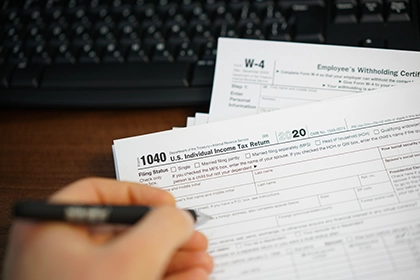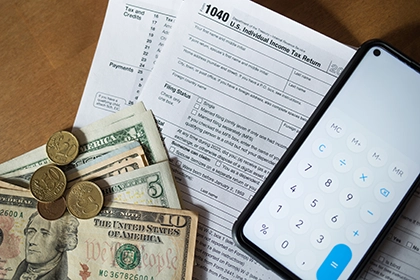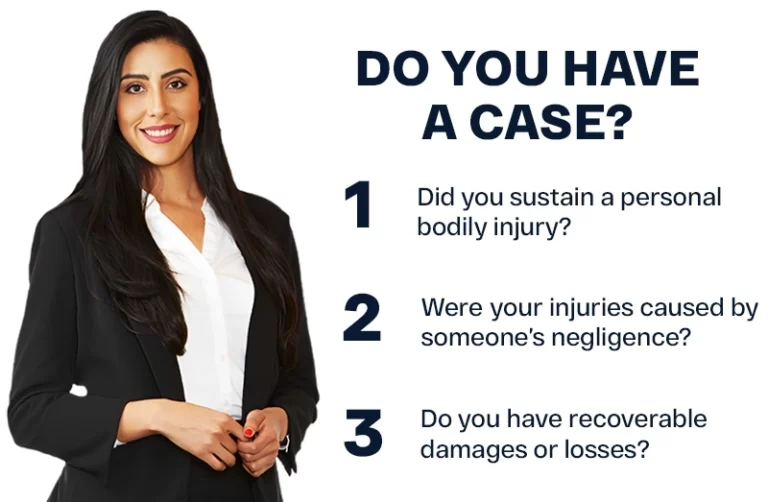Table of Contents
A personal injury settlement encompasses various damages, including medical expenses, lost wages, and pain and suffering. It aims to help injury victims recoup their costs and seek compensation for their losses. If victims are successful in pursuing a legal claim, they may be asking: Are personal injury settlements taxable by the IRS?
If you were injured in an accident that wasn’t your fault and are seeking compensation, you may be wondering if you need to report the potential settlement as income. Generally, the nature of each allocation in the settlement determines whether you need to report it to the IRS.
The IRS has specific rules on settlements, court awards, and damages, including compensation for medical expenses, emotional distress, and punitive damages. Awards for exemplary or punitive damages are taxable and must be reported to the IRS. Some personal injury settlements are generally non-taxable, specifically those for compensatory damages. Nonetheless, you can still choose to report them to the IRS.
Understanding your tax responsibilities will enable you to estimate how much you’ll be able to take home after deducting the cost of your liens, injury attorney fees, debts, and other expenses.
Do Personal Injury Settlements Need To Be Reported To The IRS?
According to IRC Section 61, all income from any source is taxable unless it falls under an exemption in IRC Section 104. Some portions of your personal injury settlement are considered taxable income, such as the amount you obtain for punitive damages. In that case, you must file Form 1040 (U.S. Individual Income Tax Return) and report it to the IRS.
On the other hand, you don’t have to report non-taxable income to the IRS. Most personal injury settlements fall under this category, but it depends on the specific circumstances and allocations.
Although you are not required to inform the IRS about the amount you obtain from compensatory damages, you are still free to do so. After all, reporting doesn’t mean you will automatically be taxed. Letting the IRS know about your non-taxable income can help reduce the chance of receiving questions regarding inconsistencies in your tax return.
How Will I Know If My Settlement Is Taxable?
Determining whether you should include the settlement proceeds in your income depends on several factors. Each allocation might have different taxation rules. Some portions might be taxable, while others are not.
You have to consider what the allocation is for. Usually, it doesn’t count as taxable income if it’s meant to replace your losses, such as hospital bills and treatment costs.
However, there are also cases where you should pay taxes on it. Let’s say you acquire compensation for medical expenses you previously deducted from your tax return. In this situation, you must report that portion as income in the year you obtain the settlement.
If you previously took a tax deduction for $15,000 of injury-related expenses, you must declare $15,000 as income once you collect payment.
How Do You Determine The Allocation For Each Category Of Damages?
Your team of injury lawyers will need a detailed, comprehensive breakdown of your damages. If your lawsuit includes other claims besides your personal injury case, they will also explain the damages assigned to each claim.
Do I Have To Report Personal Injury Settlements To The State?
Individuals earning more than a minimum threshold must file income tax returns to the California Franchise Tax Board and the Internal Revenue Service. For personal injury settlements, any portion considered taxable income by the IRS is also taxable income by the Franchise Tax Board. Therefore, you must report the taxable portion. While not mandatory, reporting the non-taxable proceeds can prevent future complications.
What Settlement Proceeds Should I Report To The IRS?
Most personal injury settlements, such as those from car accidents, slip-and-fall incidents, truck collisions, wrongful deaths, and premises liability claims, are generally non-taxable. However, you must report some allocations as ordinary income, including:
- Interest incurred on court awards and damages.
- Compensation for lost wages or lost profits (in some cases).
- Attorney’s fees (if the gross income includes the underlying compensation).
A personal injury lawyer can work with tax consultants to help you understand the implications of your settlement and how to handle them properly.
Should You Report Compensatory Damages As Income?
Compensatory damages are not taxable because they reimburse the victim’s losses. These monetary awards compensate the victims for personal injuries, medical expenses, and other economic and non-economic damages.
The IRS does not consider these damages income since the compensation is intended to help the victim recoup their costs. There is no net gain because the award offsets the losses incurred. Thus, you can typically omit them from your tax return.
However, there’s an exception for medical expenses. If the proceeds compensate for medical expenses incurred in more than one year, you must separate them on your tax report accordingly. You should allocate them pro rata according to the year(s) the expenses were incurred.
For example, you were hurt in a highway construction accident in 2021. You sustained severe fractures, eye injuries, and a head injury. As a result, you spent $20,000 on emergency care, hospitalization, and surgery. In 2022, you spent $10,000 on ongoing care and rehabilitation. In 2023, you acquired a settlement of $30,000 for medical expenses. On your tax report, you would indicate $20,000 as compensation for medical expenses in 2021 and $10,000 for medical expenses in 2022.
There are other, more complex scenarios than the example above. If you have further questions, your experienced injury lawyer can guide you on handling these allocations correctly.
Do You Have To Pay Taxes On Emotional Distress Settlements?
In California, allocations for emotional distress are generally exempt from taxation when they are associated with the physical injuries sustained from the same accident. This implies that you may not be required to pay taxes on a settlement for pain and suffering resulting from a burn, brain injury, or spinal cord injury.
On the other hand, if the emotional distress settlement does not stem from bodily injuries or illnesses, it may qualify as taxable income. For instance, you developed PTSD after witnessing an Uber accident, but you did not sustain physical harm. The compensation for your mental trauma may be taxable, and you must report it to the IRS. However, you can exclude damages for medical care and treatment.
Do You Have To Pay Taxes On Property Damages?
Property damages, which fall under economic or compensatory damages, are generally not taxable. This type of compensation aims to reimburse you for repairing or replacing your property (e.g., your vehicle in a car accident claim).
However, you need to report the difference if you collect more than the actual worth of your property or if you gain damages for the reduction in value. For example, if you took $25,000 for a car worth $20,000, you must report the $5,000 difference on your state and federal income tax returns. Our car accident lawyers work with experts to determine the accurate amount of your damages, including the repair cost of your vehicle. If you have concerns about tax allocations, our attorneys can help you with those as well.
Is Compensation For Lost Wages Taxable?
Damages for economic losses, such as lost wages or benefits, can be excluded from your gross income if they result from a personal physical injury or physical sickness. For employment-related lawsuits (e.g., due to wrongful termination or workplace discrimination), the following are considered taxable:
- Allotment for lost wages, such as back pay, severance pay, or front pay.
- The portion of your lost profits that’s attributable to the continuous operation of your trade or business.
Workers’ compensation for physical injuries or illness is generally not taxable. For instance, you sustained workplace injuries due to chemical exposure, construction accidents, crane accidents, or electrocution. If you obtained compensation for lost wages, this is typically exempt from taxes. If you need further guidance, a workers’ compensation attorney can help.
Are Punitive Damages Considered Taxable Income?
Punitive damages in personal injury claims are considered taxable income. You must report them to the IRS and your state on your tax return and pay taxes on that amount. However, punitive damages awarded in wrongful death claims can be complex and may require review by a tax consultant.
Plan for the tax consequences if you obtain such an award. Your team of injury attorneys can connect you with tax consultants who can help you understand and manage these obligations correctly.
When To Report Settlement Payments To The IRS
Understanding when to include settlement payments on your tax return is important to comply with IRS regulations and avoid potential penalties.
- Calendar Year Taxpayers — You should report settlement payments during the tax year you acquired them. This means that even if you obtained the settlement agreement in a previous year, you must report the settlement payment on your 2024 tax return.
- Cash Method and Accrual Method — The cash method requires you to report your income when you get it, physically or constructively. Under the accrual method, you must record your income as soon as you earn it or remove any significant restrictions on its receipt.
- Structured Settlement Payments — You can opt for regular payments over a set period instead of getting a lump sum. If your settlement agreement includes this arrangement, you must report the income as soon as you obtain each payment.
Consult an accountant or a personal injury attorney if you’re unsure when to report your settlement. They can assist you in complying with your report and answer all your questions about IRS compliance.
Why Do You Need To Report Your Settlements To The IRS?
Proper reporting of settlement payments helps maintain compliance with tax laws and may help avoid penalties. The IRS processes millions of tax returns annually and conducts audits to verify that taxpayers fulfill their reporting obligations.
Furthermore, inconsistencies on your tax return could lead to an audit. If you fail to fulfill your responsibility, you may face penalties, interest, and potential legal repercussions.
You should talk to a tax professional or personal injury attorney in California if you are worried or confused about how to report settlement payments or need help with your specific case. They can give you legal advice relevant to your situation. They can also help you determine whether certain allocations are taxable, guide you through the complicated rules, and offer personalized advice.
Contact Our Personal Injury Attorneys In California
Taxes and laws can be complicated, so it’s recommended to consult professionals who can help maintain compliance. While you may benefit from consulting an accountant licensed in your state, a personal injury lawyer can also guide you on how your personal injury case might intersect with tax implications.
Are you thinking, “I need a personal injury lawyer?” If you need guidance on the tax implications of your potential settlement, Arash Law’s personal injury law firm in California can help. Our personal injury attorneys can walk you through the legal and tax considerations related to your specific case. We will assist you in the following ways:
- Filing a personal injury case.
- Determining what damages you may pursue.
- Identifying taxable portions of your settlements.
- Coordinating with tax experts regarding your settlement.
- Addressing potential tax consequences.
Contact our personal injury lawyers at (888) 488-1391 for a free case review. You can also fill out our “Do I Have A Case?” form to provide us with the details of your case. During our consultation, we can guide you through your legal rights and options.
While we can’t address every possible tax scenario, we can discuss how taxes might influence your settlement. If you have questions or concerns about your case, our injury attorneys can discuss them with you.
Our injury lawyers represent victims from all over California, including Los Angeles, San Diego, San Francisco, Sacramento, Fresno, Visalia, Oakland, San Jose, Beverly Hills, Riverside, Pasadena, Sherman Oaks, and more.










